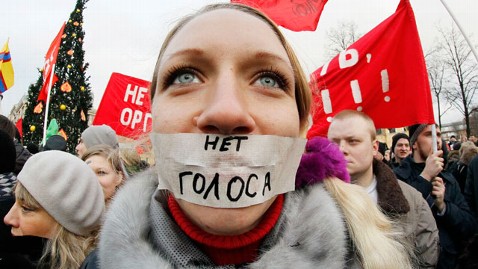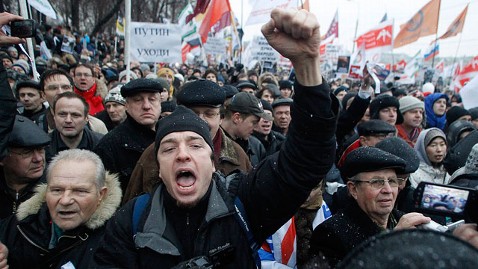Russian President Answers Protesters on Facebook

(Dmitry Lovetsky/AP Photo)
Russian President Dmitry Medvedev went on Facebook today to answer the tens of thousands of demonstrators who took to the streets in cities all across the country calling for new elections and the resignation of Prime Minister Vladimir Putin.
In a post on his Facebook page, Medvedev dismissed the demonstrators' complaints, but said he has called for an investigation of the parliamentary elections last week, which demonstrators and independent observers said were riddled with fraud.
"Under the Constitution, citizens of Russia have freedom of speech and freedom of Assembly. People have a right to express their position, which they did yesterday," Medvedev's short post said. "Well, that all took place within the framework of the law. I do not agree with any slogans or statements made at the rallies. Nevertheless, I have given an order to investigate all correspondence from polling stations regarding compliance with election law."
Among the thousands of responses, most were derisive of the president and his statement.
"Doesn't the president of Russia agree with the slogan "For honest elections"? one wrote.
Another said, "A stuffed clown, not a president."
Political analysts also expressed surprise that Medvedev would respond is such an apparently informal manner to the largest public demonstration in Moscow since the collapse of the Soviet Union. The protests were remarkable not only for their size and peacefulness, but for the range of participants: There were people of all ages and the entire political spectrum of opposition to the current government.
"The public opinion is that everyone understands that there was (election) fraud, or a majority understands it," Russian political analyst Dmitry Oreshkin said. "In such a situation, what the president should have done, instead of posting on Facebook, is to create a commission, to include officials from the polling stations, members of the party structures that were monitoring the election, members of the press, and members of social organisations that have a right to monitor the elections and recount the votes. It's not that complicated."
He said Medvedev should at least have been more precise in stating what actions he had taken in response to the protests.
"He didn't say to whom he gave the order. Did he give orders to a firefighting squad? To an ambulance? Or maybe to the Emergencies Ministry? After all, it should have been stated, it's either the Prosecutors, or it is the Investigative Committee, or is it the Central Elections Commission," Oreshkin said in an interview with The Associated Press. "If it's the Elections Commission, this means it is investigating itself at a time when people are expressing their mistrust of it. So I think it's an ineffective move. I think that the president will receive much more critical remarks from the Internet community than voices of support."
Tens of thousands of people took to the streets in Moscow Saturday in the largest of more than 70 protests across Russia, to voice their anger at alleged election fraud and to demand that the results of the parliamentary elections be cancelled, a new election be held, and Putin resign.

Opposition leader Boris Nemtsov, one of the organizers of the rally, explained the protesters' demands to ABC News.
"Our demand is to cancel these criminal elections, because Putin stole about 13 million votes. Secondly, to fire Mr. [Vladimir] Churov, who is responsible for the election and to organize a criminal investigation against him. The third point is to register the opposition. For example, I represent the People's Freedom Party. [Churov] rejected us from registration. Next point, in the next election, freedom for political prisoners. I feel that we have reached a point where people are very angry against corrupt and criminal power," said Nemtsov.
Posters read, "Crooks and thieves have stolen our votes," "Putin go away," "Free and honest elections," and "We are not mute."
Police estimated that 20,000 people protested at Bolotnaya Square in downtown Moscow, on an island across from the Kremlin. But organizers claim that more than 100,000 gathered, calling it Russia's biggest demonstration since the collapse of the Soviet Union.
About 50,000 police and 2,000 paramilitary troops were deployed in Moscow in preparation for the protests. Most rallies across Russia were approved by city authorities in an effort to avoid violence, which was seen as a sign that the Kremlin has started to sense the people's change of mood.
Aside from the politicians who addressed the crowd were Boris Akunin, one of Russia's best-selling authors, and writer Dmitry Bykov, as well as TV personality Tatyana Lazareva.
The protests were mostly peaceful, with few clashes and arrests. As people left the square, they said, "Thank you" to the police.
Neither Putin nor Medvedev commented on the demonstrations Saturday, and Rossiskaya Gazeta, the official government newspaper, posted just a few paragraphs acknowledging that the demonstrations occurred.
Former Prime Minister and opposition leader Mikhail Kasyanov told ABC News that Saturday was a happy day.
"People are finally waking up. Russia is waking up. I think that it's the beginning of the end of Putin's regime today. Today all political groups are here … talking about the same thing," he said. "These elections were not valid. That's what our demand is, to announce these elections void and to call for a free election. We need free, fair and credible elections."
Eugenia Albats, editor in chief of the liberal opposition magazine The New Times, said she was impressed by how many young people turned out for the demonstration.
"I am disgusted with the people in power. … It's no longer tolerable. I think it's time to tell Putin, 'It's time for you to step down,'" Albats told ABC News. "We've never seen such young faces at the democratic rallies. This is young Russia, the people of this new generation who are telling Putin, 'Go. Step down. Your time is over; we are not going to tolerate this anymore.'"
The protest was a test of the opposition's ability to turn public anger into a mass protest movement on the scale of the Arab Spring rebellions that brought down rulers in the Middle East and North Africa.
"This rally shows that Russia is waking up, that the civil society in Russia does exist, that the middle class in Russia does exist. All across Russia, people are ready for the party in power, and most importantly Putin, to step down. He has to go. It is just the very beginning of a very difficult protest to get the country back to the people. It will take not weeks, it will take months," Albats said. "The whole question is whether Putin decides not to shoot at his own people, or he decides to use power against us. It's a very likely possibility."
The protest organizers have given authorities two weeks to implement their demands. If their demands are not realized, they said, they have scheduled a rally for Dec. 24.
"We will be back," the crowd shouted.
ABC News' Tanya Stukalova contributed to this report from Moscow.